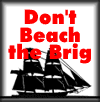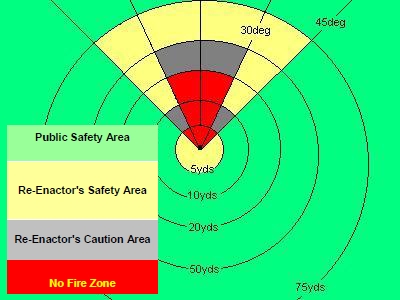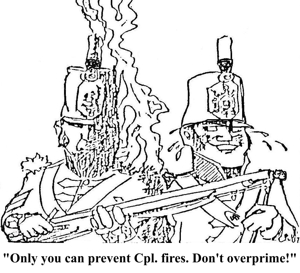|
||||||||||
|
CMHS Home
War of 1812
Activities 
|
CMHS Safety CodeThe following is a guide for use in all CMHS Units 
This code is designed to guide the individual in fulfilling their commitments to a unit of the CMHS, the historic sites, and the general public, both in terms of safety and authenticity. By following this guide and building on its principles the individual member will become more beneficial to his/her unit and in turn (it is hoped) create an 'Esprit de Corps' that will benefit all concerned. All units (and therefore all individuals therein), of the CMHS must be very aware of safety and authenticity in order to fulfill our commitment to the public, ourselves, our insurance company, and other reenactors. Black PowderA compound of sulphur, salt-peter and charcoal, that ignites easily, burns rapidly and explodes if confined. It should be treated with a great deal of respect. Each individual using powder should obtain a safe magazine for the storage of tinned powder and more rounds in their homes. The magazine must be strong and its contents clearly marked on its exterior. It should be made of a non-ferrous material. Due to its components, black powder and its smoke can be an irritant to some people so caution in handling must be exercised. Be aware that the noise generated by a black powder weapon can cause hearing loss. You may want to use commercially produced earplugs which are designed to stop heavier sounds, but still enable you to hear orders (eg. Foam earplugs which are now available in flesh tones). Musket rounds are to be prepared in a safe and secure area. Rounds are to be made of paper with no staples, glue, wax, or other foreign substances and are to contain a maximum of 100 grains of powder (it is not necessary to exceed this amount for any reason). At an event, musket rounds can be kept in a properly made cartridge box. Any rounds that exceed the capacity of your cartridge box should be stored in an appropriate area. If you smoke, do not do so when you or anyone else near you are carrying rounds in a cartridge box. Also, when 'powdered up' (carrying rounds) give all open flames a wide berth ie. campfires. The MusketThe musket is a functioning weapon and should be treated with due respect. You are responsible for its maintenance:
When you are firing in line it is sometimes difficult to tell by recoil if you had a misfire. There are several types of misfires and therefore different ways of clearing them.
Edged WeaponsAll edged weapons must have an appropriate and sturdy sheath or scabbard. Edged weapons are to be dull (unless it is a camp impliment and therefore not taken onto the tactical area). Never give an edged weapon to the public (bayonets included). Do not fix bayonets without orders on parade, or without permission while participating in a single person, controlled demonstration where one is showing the public how it fits onto a musket, from the officer or senior NCO and never in an opposing line tactical. General Tactical SafetyAlways be attentive to all that is happening near you. Be aware of the position of the public. Listen to your officers and NCOs. If you are given a safety caution, obey it. If you do not agree with it, discuss it with your officer or NCO later. The battlefield is no place for discussions. When in doubt, err on the side of safety. Camp SafetyMost period encampments are open to the public and so you must be aware of their presence at all times. Cook fires should always be attended. Caution should always be used when handling hot food or cookware. Everyone is responsible for the policing of the camp. If you see something that appears unsafe, bring it to the attention of your NCO or (if it does not interfere with another duty) fix it yourself. Keep the camp tidy. Do not allow members of the public to go through boxes or tents without supervision, even if they do not belong to you. When away from your tent, keep it closed. If you see something unsafe happening that involves a member of another unit (unless it is a case of impending doom) immediately inform your NCO or officer who will approach the event safety officer. Safety and the CMHSOne of the benefits of membership in the CMHS is liability insurance which is now required at most events. For this reason the CMHS reserves the right to satisfy itself as to the safety of all units within the CMHS. All military members (meaning those that carry weapons) of a unit, no matter what rank, must pass an infantry safety test. This test must also be passed by NCOs and officers so that it is clear that they fully understand the hazards and appreciate the maintenance of the weapons and the drill. Anyone who fails this test will be allowed to repeat it until they pass. All persons handling a musket must be at least 16 years of age (under 18 years of age must be accompanied by a member who is the immediate supervisor whenever a musket is handled by such person). Unit officers and NCOs will be tested by a representative of the CMHS. Other ranks will be tested by their officers. 
|
|||||||||

